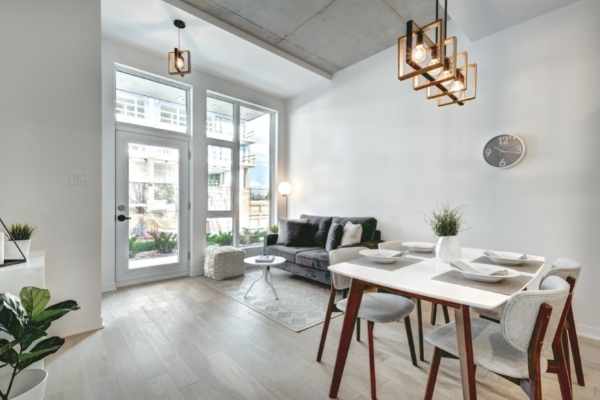|
You likely chose to live in a condominium to make life a little simpler and to free yourself from the headaches or maintenance that comes with owning a home.
However, much like homeowner’s insurance is a critical element of owning a home, having the proper condo unit owner’s insurance is also important. Although your condominium association carries insurance, that is not necessarily going to provide coverage for your portion of the unit, your personal belongings, liability, or your loss of use. If you are currently in the market for the perfect condo for you and your family, keep in mind that you will need to invest in insurance, not only because it is required by mortgage lenders, but also because it will give you peace of mind. What does your Condominium Association Insurance Policy provide? The simple answer is that it typically covers everything from your drywall outward of your individual unit. Your condo association has what is called a Condo Master Policy. This policy covers the building itself, and that usually includes the common areas, offices or staffing spaces, and the building structure itself. If someone is injured on the property, in certain common areas, or if something goes wrong with the shared amenities and equipment such as elevators and other building systems, this policy covers those circumstances. However, it does not cover your own personal property nor the portion of your unit you own and are responsible to replace in the event of damage. Condo owners in Florida used to be required to purchase condo insurance by state law, but this is no longer the case. That being said, you should consider your risks and be aware that your mortgage lender will require it, and your condo association may also require it. What does your Condo Insurance Policy Typically Cover? Condo insurance policies (also known as an HO-6 policy) can be customized to fit your needs. In basic terms, condominium insurance provides coverage for your unit where condominium association insurance does not. A typical condo insurance policy covers your personal belongings and pays out if someone is injured inside your condo. You are responsible for the interior of your unit, so think “wall covering-in” to help define It. For example, wall texture, paint or wallpaper, kitchen, bathrooms, cabinetry, flooring etc. Much like renter’s insurance, condo insurance covers the interior of the unit. However, renter’s insurance only insures your personal belongings. Typically, for a condo owners insurance policy, you would need personal property and liability coverage in addition to coverage for your floors, wall coverings, cabinets, and fixtures that your association’s insurance does not cover. Appliances If your appliances, like your stove or washing machine, were already in your condo when you purchased it, be aware that you are liable for them. That is because “walls-in” coverage refers to anything within your unit. Your condo association’s insurance doesn’t cover them. This is true even if you didn’t bring the appliances into the condo yourself. Personal Belongings Anything inside the walls of the unit, including any items of personal property, are your responsibility. What is personal property? I like to think of it this way - If you turn your property unit upside down, everything that would fall out is your personal property. And just like with appliances, condo association master policies do not cover unit owner’s personal property. Liability What happens if someone gets hurt in your condo and they file a lawsuit? This is just another reason to get your condo owner’s insurance policy in place. That circumstance would be covered by your personal condo insurance, and not the condo association’s insurance. Every association’s insurance policy is different regarding what each unit owner is responsible for, so it is important to review your association’s policy and condominium by-laws carefully. There are circumstances when the association documents state that you are responsible for the walls and what is inside of the walls, including windows and doors. In cases such as this, you must make sure your unit owner’s insurance policy covers these items. Loss of Use If your condo unit becomes damaged and you are unable to reside in your condo, loss of use coverage will help pay for temporary housing, including any increased cost of food and other extra expenses you incur while completing repairs. Of course, the damage must be caused by a covered loss in the policy. However, the Loss of Use limit may be calculated on a percentage of your personal property limit, so be certain to confirm this detail when purchasing a policy. Investing in the Right Condo Unit Insurance As you can see, if you do not purchase insurance coverage for your unit, none of your personal belongings will be protected, and this puts you at risk. You must always remember that a catastrophe such as a fire or hurricane can happen at any time. Life is unpredictable and it’s important to make sure you are covered if disaster strikes. Whether you are purchasing a new condo or you have an existing condo owner’s insurance policy, we are here to help. We are happy to offer free policy reviews to help you ensure you have the right policy for your needs. Give us a call today at (561) 288-6434 or contact us here.
1 Comment
6/8/2023 12:50:28 am
Having the proper condo unit owner's insurance coverage is essential for protecting your investment and giving you peace of mind. While the condo association's insurance may cover the building and common areas, it won't protect your personal belongings, liability, or loss of use. Purchasing condo insurance ensures coverage for your unit's interior, personal property, and potential injuries inside your condo. It's not only required by mortgage lenders but also crucial for safeguarding your interests. Don't overlook the importance of having comprehensive condo insurance coverage.
Reply
Leave a Reply. |
AuthorKaren Schiffmiller Archives
July 2024
Categories |





